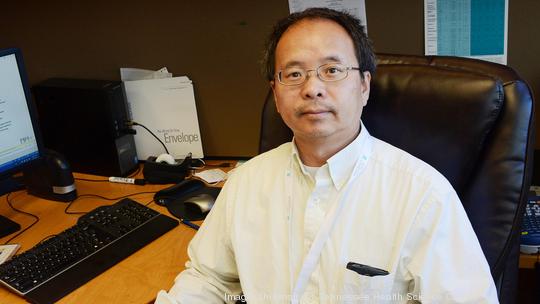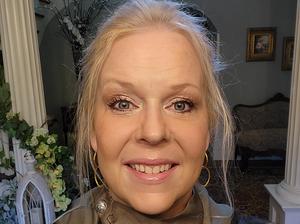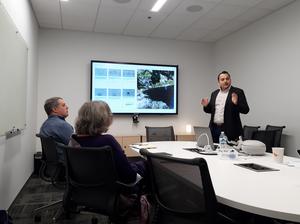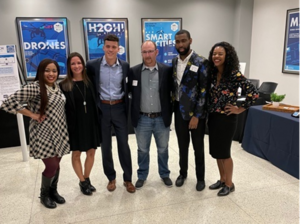
There is a protein called MDM2, which helps cancer cells survive, allowing them to quickly grow large.
But by degrading the MDM2 protein, cancer cells will die, stopping tumor growth — and this is what University of Tennessee Health Science Center (UTHSC) faculty member Wei Li, Ph.D., hopes to do.
Li is the founder of SEAK Therapeutics, a UTHSC-connected startup that’s in the early stages of developing a compound called SEAK-114, which is expected to act as a targeted leukemia therapy.
Li is working on the project with Emory University and the Children’s Hospital of Atlanta, and his lab at UTHSC has received a $2.5 million grant from the National Cancer Institute for the compound. SEAK, as a company, has received two federal Small Business Innovation Research (SBIR) grants totaling about $700,000, and one of these was partially matched with $100,000 from entrepreneurial support organization LaunchTN.
“They’ve been really, really helpful,” Li said of the group.
SEAK settled on its current focus after going through a program offered by the National Institutes of Health (NIH) that helps startup founders learn what customers need.
“A lot of the time, we develop something in the lab, and then, as a scientist, think, 'Oh, this is cool, this must be useful,'” Li said. “But when you go to market, for one reason or another, it may not have the need, which is a business failure.”
So, through the program, Li and his team talked to investors, pediatricians, pharmaceutical company researchers, and patients to determine the best steps to take.
They learned that in acute lymphoblastic leukemia (ALL) — which is prevalent among children — the cure rate for kids was already high. Li said it’s about 90%.
“There’s very little room for improvement,” Li explained.
Yet in another type of leukemia, acute myeloid leukemia (AML), they found that the cure rate was much lower. Li put it at 50% to 60%.
This is one of the reasons SEAK will start by focusing on AML, but it’s not the only reason. AML is also more common in adults, the demographic the company will have to start with — because pediatric doctors have told Li they’re hesitant to give the drug to children until its efficacy and safety is proven.
“You don’t want to risk the potential toxicity of side effects for kids,” Li said. “A 70-year-old cancer patient is one thing; but for a four-year-old cancer patient, the possibility of toxicity could have a very different physiological impact.”
If SEAK does clinical trials in adult patients first, however, and is able to demonstrate it’s safe, then pediatric doctors will be more willing to use it.
If Li’s startup can successfully develop the compound, it could have fewer side effects than other cancer treatments. For example, some chemotherapy drugs can damage normal cells, in addition to cancer ones, because of the way they kill cells. But because the SEAK compound would target the MDM2 protein, it could have a more minimal impact on the patient’s normal cells.
This is all a few steps down the drug development pathway, though. Right now, they’re developing the compound. And long term, Li doesn’t plan on being the one to shepherd the product through the FDA-approval process. He hopes to find a partner — likely a biotech or pharmaceutical company — to do this.
“The late stage would be partnering with someone who has experience in working with the FDA and with clinical trials,” he said. “And hopefully they can get it approved, so it can benefit the patient, in the end."









